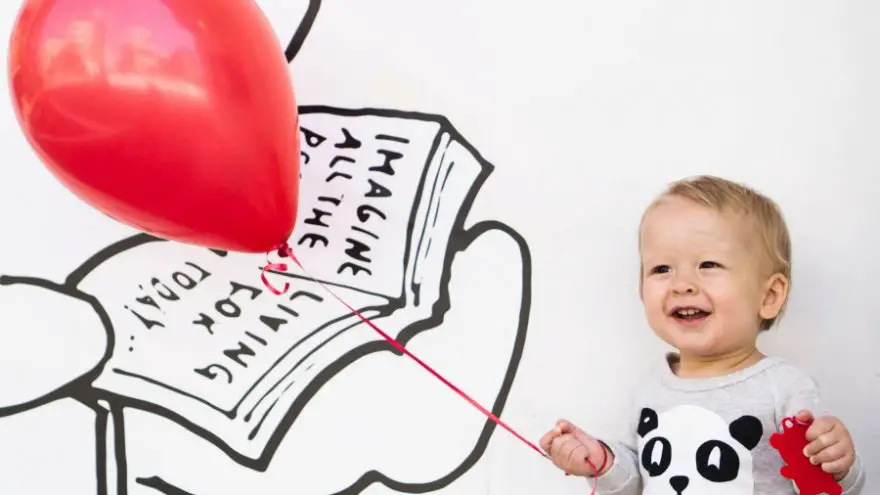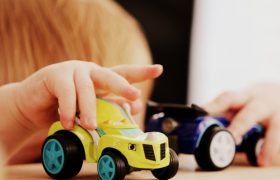Childhood Fears Age by Age: What Scares Toddlers?

It’s 3 am, you’ve just finished putting the last load of laundry in the dryer when you hear the familiar sound of sobbing down the hallway. Your toddler is awake again, and crying this time. This isn’t just the normal nightly bedtime protest where they want yet another glass of water. They are scared. Deep breath you walk quickly but quietly down the hall. You know that they need your support but you also don’t want this to become a new routine of late night counseling sessions about the monster in the closet.
Knowing what to do when your toddler is afraid is hard, especially when they can’t always explain to you exactly what the problem is. Learning to cope with your own fears and anxieties is hard enough, but teaching a toddler how to do it can seem impossible.
The first step is realizing why toddlers have fears, then assessing what those fears are, what is at the root of them, and then helping your toddler find successful workarounds until the fear subsides.
Toddlers are fascinating little humans. They are always swinging wildly between dependence and independence. They have strong opinions on everything from favorite toys, to the best color for a cup to be, even to what is and is not fair. They also have strong feelings of love, of anger, and often of fear.
It can be hard to anticipate what your child will be feeling from one moment to the next, and fears can seemingly pop up at random. While every child is different in temperament and experiences which will change the specifics of what they fear, most children are going to have some issues with a few key areas of life.
The unknown
Being afraid of the unknown is really common across all age groups. Toddlers, in particular, have begun to harness their imagination but are not always able to tell fantasy from reality and their little imaginations can get the best of them. Being afraid of the dark or monsters is common at this age.
Fear of bath time can also be related to the unknown factor. Many littles are positively convinced they will also go down the drain when the plug is pulled.
Be mindful of their media at this age as well, even ridiculous fantasy stories can end up causing nightmares and phobias, especially if your child lets their imagination run wild.
Explain what you can, knowledge really is power. Show your toddler that only water will go down the drain. Be willing to help them set boundaries by flushing the toilet with the lid closed to limit the loud noises a bit, and praise them for bravery when they succeed.
The inexperienced
Toddlerhood is an amazing adventure, but so many new experiences in such a short amount of time may end up stoking fears. Many toddlers are afraid of new experiences like using the potty, going to daycare or preschool, or even riding in a new car.
When your toddler has a fear-based reaction to something, it’s time to slow down. Remove them from the situation if possible, take them aside and try to find out what they are afraid of, what they think might happen, and see if you can find a way to ease into the situation. Taking a little time to talk it through may be all your child needs, although sometimes they may require breaking a new experience down into smaller steps so they can work their way through it.
Many new experiences end up being okay in the end, but the first few times can be rather rocky. Accommodate wisely. Although it may be tempting to leave your child’s room light on for them to be able to sleep without fear of the dark, remember that our bodies need the dark to fall fully asleep. Purchase a small night light that isn’t overly bright and give your child a red filtered flashlight so they can have more control over the situation but also fall asleep again quickly.
The uncontrolled
Toddlers thrive on routines and love to know what to expect next. Any situation where they can’t reliably predict what will happen can be frightening from being afraid of getting lost at the store, to meeting a new dog, if they feel out of control in a situation they are not going to be happy.
Be empathetic and supportive. If your child is afraid of a dog, don’t force them to interact. Hold your child from a reasonable distance and talk in hushed tones about the dog in a positive way. Let your toddler know it’s okay that they are afraid and that you won’t force them to pet the dog if they don’t want to.
Think of yourself as your toddler’s tour guide and head off some fear-based anxieties by explaining early what will happen. For example, telling a toddler what to do if they get lost can help them to have a plan.
Most toddler fears are eventually outgrown, although some true phobias will stick around. Nobody is really quite sure what ticks the box from typical childhood fear to lifelong phobia but the parental reaction may be a key factor, so do your best to walk the line between minimizing and empathizing. Making too big of a deal out of things or allowing your child to avoid new challenges forever can set them up for long-term problems, however ignoring or belittling their feelings will do just the same.
Treat your child with respect and help them learn to cope with their fears in healthful ways, and always be there for a hug if they need one. Remember that you’re the person they trust most in life, and take that responsibility as seriously as they take their fear.
As your child ages, their fears will morph and change, but they will always need your help learning to deal with them, even if they don’t always know how to ask for help. Be proactive by watching their reactions to things and having an open dialog about how to figure out the best way to move through feelings of fear.







